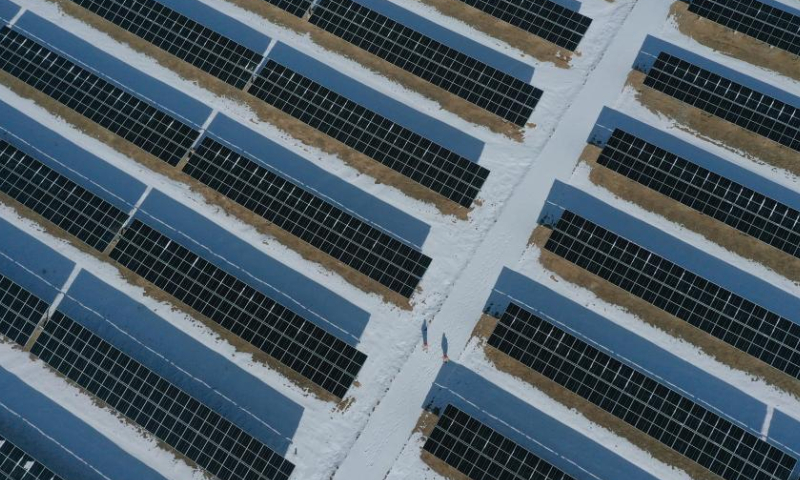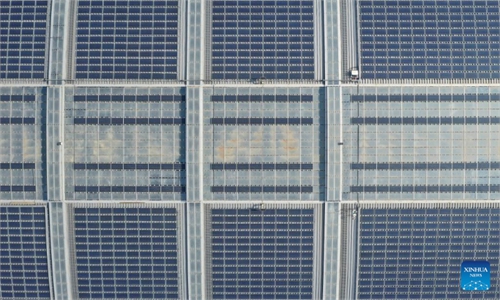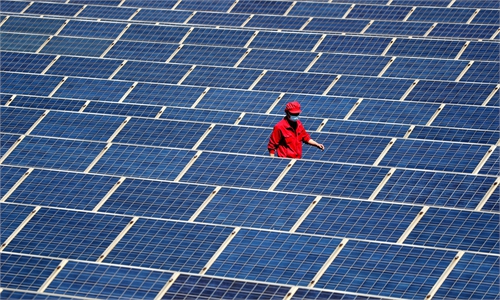
Aerial photo shows staff members inspecting a photovoltaic (PV) power station in Gonghe County of Hainan Tibetan Autonomous Prefecture in northwest China's Qinghai Province, Feb. 8, 2022. Parts of Qinghai are faced with temperature drop and snowfall recently. Staff members of a power company enhanced the inspection of the PV power station to maintain the power supply during bad weather. (Xinhua)
By recklessly politicizing normal trade in photovoltaic (PV) products with China, the US is hurting the profits of its own industries and putting up barriers on its emissions reduction path, analysts said on Tuesday, after Washington revealed preliminary results of a probe and accused four Chinese solar panel producers of "circumventing" US tariffs.
It is not a smart move for the US to adopt a policy of "decoupling" from China in the PV sector, Lin Boqiang, director of the China Center for Energy Economics Research at Xiamen University, told the Global Times on Tuesday.
China is the largest producer of PV products. By supplying solar panels to the global market at competitive prices, it is making a contribution to addressing the climate change crisis faced by the whole world. The US is heading in the opposite direction by attempting to exclude Chinese producers from its supply chain, said Lin.
The US Department of Commerce on Friday released a preliminary result of an anti-circumvention inquiry, stating that it found four Chinese PV makers were dodging tariffs, including units of BYD Co, Trina Solar Co, LONGi Green Energy Technology Co and Canadian Solar Inc.
The US will impose new duties on imports from the four firms, Reuters reported, noting that it was "bad news for US solar project developers".
The US solar industry has been highly dependent on imports of solar panels. If Washington recklessly chooses to impose new tariffs, there is no doubt that many new-energy projects will be put on hold in the US, dampening the Biden administration's goal of decarbonizing the country's electricity sector by 2035, analysts said.
It is not in line with the global mission of reducing carbon dioxide emissions either, Lin noted.
Although the Biden administration's adoption of such an unwise move is going to hurt its own industry, it seems that US domestic political wrestling will ensure that American solar project developers can't dodge the risk.
Republicans are urging Biden to be tough on Chinese solar panels makers over "human rights", according to Bloomberg. However, the so-called "human rights" problem in Northwest China's Xinjiang Uygur Autonomous Region is a "lie cooked up by the US", serving its vicious aim of containing China's development.
China's Foreign Ministry responded on Tuesday that the US legislation on Xinjiang is based on lies and has seriously disrupted normal China-US trade in PV products.
"It violates the market laws and international economic and trade rules, and undermines the stability of the global photovoltaic industrial and supply chains as well as global action on climate change. It will backfire and hurt the US' own interests," Foreign Ministry spokesperson Mao Ning said.
Only cooperation could enable the US and the world to quickly promote greenhouse gas reduction goals. It is suggested that the US could promptly redress its wrong policy and stop politicizing normal trade with China, Lin said.
On Sunday, LONGi told the Global Times that its production and operations will not be materially affected in the short term, and it will actively provide evidence that shows it is compliant with the US trade law and not circumventing it.
BYD and Trina responded on Monday that there is no impact on them currently, and Trina said it has already made plans to cope with potential risks, according to media reports.
Global Times


